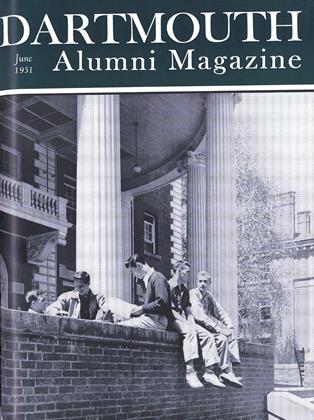I HAVE just finished reading Vincent Brome's life of H. G. Wells, and it is certainly the best so far written. I recommend it to you as an essentially tragic story of a man who was close to being a genius in more ways than one, but who wrote perhaps no lasting work in spite of the 104 titles in his bibliography—or perhaps it might be because of this.
As usual, because space is brief, I can write but fleetingly of all the titles I want to recommend to you.
You may have seen Primer for Americans by Sig Larmon '14. It is an admirable statement, with which few could quarrel, of our American creed. Printed in large type, and with simple but forceful pictures, it ought to be in the hands of millions. It first appeared in Look and is now between covers. Get a copy if you can.
The Impact of America on EuropeanCulture (Beacon Press) is a series of BBC- talks, now in book form, by such men as Bertrand Russell, Sean O'Faolain, and others, and has a reply by Harvard Professor Perry Miller. Let him have the last word: "The temptations to despair are many, plentiful enough in America, let alone in Europe; but it is not necessary either there or here that we destroy ourselves. " Right, Mr. Miller.
The Essential T. E. Lawrence, edited by David Garnett, contains a wise and colorful selection of Lawrence's writings which gives a more comprehensive picture of him than any other single volume in existence. There are selections, too, from his unpublished and highly publicized The Mint, which I once held in my hands in manuscript year's ago in Edward Garnett's Chelsea quarters in London. This is published by Cape, and I found it really enthralling save for a few passages from his Arabian despatches.
Two Adolescents, by Alberto Moravia, is a brace of stories of adolescent youths in Italy written in the brittle Continental style reminiscent of the nineteenth century masters. Certainly these stories are expertly done, but as one English critic points out, they seem to be at times much ado about nothing. In other words sex has been taken a little too seriously, and analyzed without any requisite sense of humor.
Peter Moen's Diary (Creative Age) is a poignant and moving human document written by a prisoner of the Gestapo in a Norwegian prison. Having no pen or pencil he took a pin from his black-out curtain and pricked his message on coarse, grey toilet paper. He then stuffed the sheets, rolled up, down the ventilator, and they were found after Moen's death by drowning in a German prison ship.
Here is a man's naked soul laid bare for only God to see. Full of fear, recriminations, self torture, and self analysis, it is an unforgettable human story.
War wipes out genius as it does everything else. In a book called The Unreturning Spring (Williams and Norgate, London) Henry Williamson has edited the writings of a twenty-year-old boy, James Farrar, who lost his life in a Mosquita aircraft in July 1944. His literary remains are not only promising; some of them show the hand of a poet and a master of his craft. Virtually an autobiography this book should be read by all politicians who would for one reason or another push us into another war. An extremely good book.
If not quite as good as his Tales of theSouth Pacific, now a matter of literary history, James A. Michener's Return toParadise is entertaining reading. He first wrote a series of essays about the South Pacific (some of which appeared in Holiday) and then a story which grew out of the theme of the essay. It takes no insight to recommend this one.
The Traveller's Tree, by Patrick Leigh Fermor, is, however, less known here. Printed in England, and written by one of the men who captured the German commander in Crete, General Kreipe (one of the most amazing stories of the war), Fermor has taken a long and careful journey through the Caribbean islands and written of them with a good deal of charm, honesty, and insight. There is a map and a lot of illustrations.
Here endeth my seventeenth year as browser. Salud.
 View Full Issue
View Full Issue
More From This Issue
-
 Class Notes
Class Notes1949
June 1951 By ROBERT H. ZEISER, DAVID S. VOGELS JR., JOHN F. STOCKWELL -
 Class Notes
Class Notes1918
June 1951 By ERNEST H. EARLEY, DONALD L. BARS, RICHARD A. HOLTON -
 Class Notes
Class Notes1929
June 1951 By F. WILLIAM ANDRES, EDWIN C. CHINLUND, GEORGE B. REDDING -
 Article
ArticleThe Senior Fellowships
June 1951 By EDWARD C. LATHEM '51 -
 Class Notes
Class Notes1940
June 1951 By ELMER T. BROWNE, DONALD G. RAINIE, FREDERICK L. PORTER -
 Class Notes
Class Notes1943
June 1951 By ELMER G. STEVENS JR., STANTON B. PRIDDY, THEODORE R. HOPPER
HERBERT F. WEST '22
-
 Article
ArticleSuggestions
April 1940 By HERBERT F. WEST '22 -
 Article
ArticleHanover Browsing
March 1949 By HERBERT F. WEST '22 -
 Article
ArticleHanover Browsing
November 1949 By HERBERT F. WEST '22 -
 Article
ArticleHanover Browsing
January 1950 By HERBERT F. WEST '22 -
 Article
ArticleHanover Browsing
March 1951 By HERBERT F. WEST '22 -
 Books
BooksCHICAGO: THE SECOND CITY
July 1952 By Herbert F. West '22
Article
-
 Article
ArticleWITH THE OUTING CLUBS
December 1934 -
 Article
ArticleU. S. Attorney
November 1951 -
 Article
ArticleWith Big Green Teams
July 1956 -
 Article
ArticleAlumni Sons and Daughters in the class of 1979
February 1976 -
 Article
ArticleThe Undergraduate Chair
MARCH 1967 By ART HAUPT'67 -
 Article
ArticleAN ACADEMIC HUNDRED THOUSAND
November, 1930 By President Hopkins


